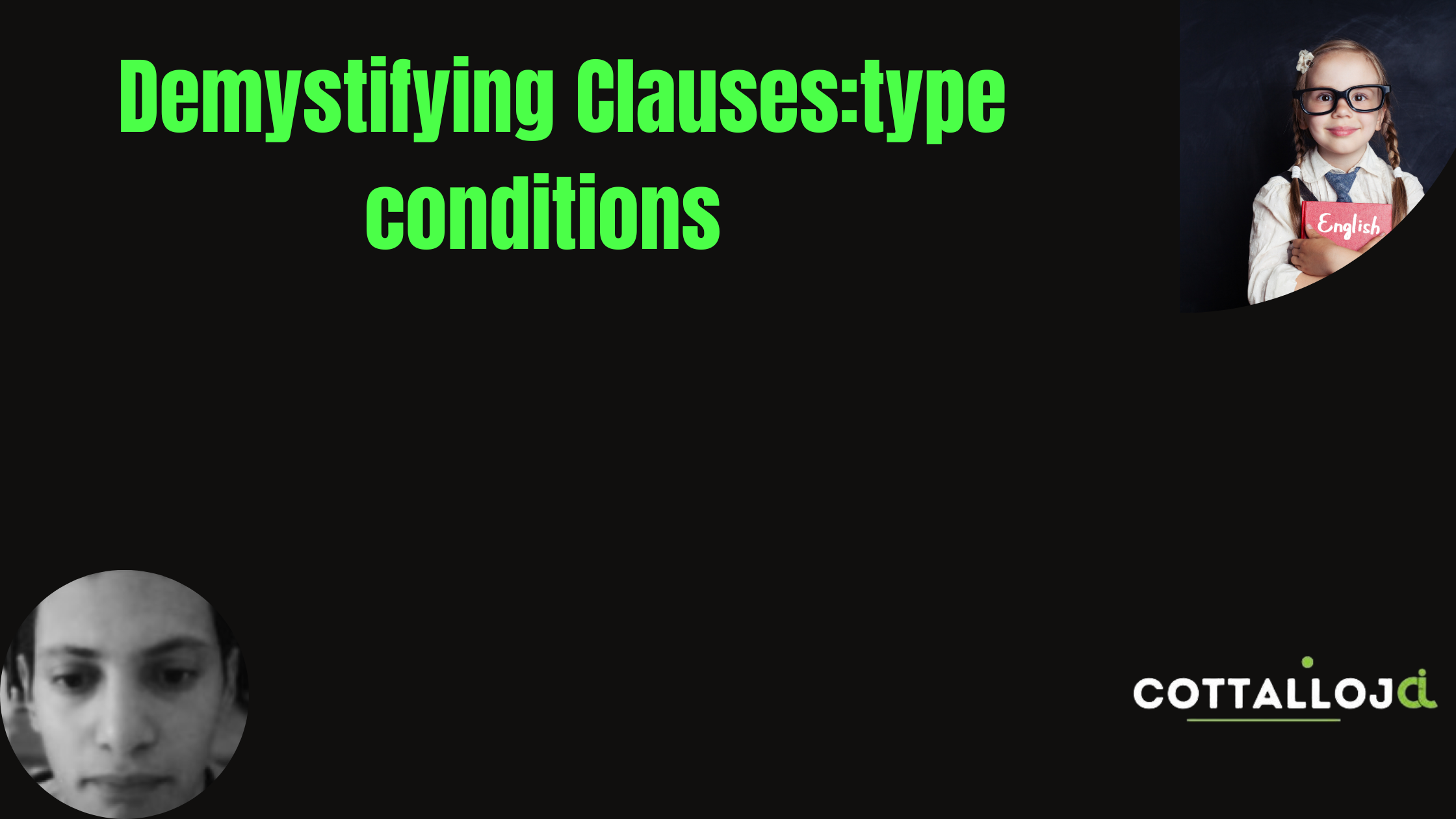Certainly! Here's a condensed lesson about conditional grammar, focusing on the four main types of conditionals: zero, first, second, and third conditionals.
Lesson: Understanding Conditionals in Grammar
Introduction to Conditionals (Approx. 150 words)
Conditional sentences are an essential part of English grammar. They express different levels of possibility, probability, and reality based on certain conditions. In this lesson, we will explore four main types of conditionals: zero, first, second, and third conditionals.
1. Zero Conditional (Approx. 200 words)
- Usage: The zero conditional is used to express general truths, facts, and natural laws.
- Structure: It follows the structure "if + present simple, present simple."
- Examples:
- If you heat water to 100 degrees Celsius, it boils.
- If the sun sets, it gets dark.
- Key Point: Zero conditionals deal with situations that are always true and have a cause-and-effect relationship.
2. First Conditional (Approx. 200 words)
- Usage: The first conditional is used to talk about real and likely future situations.
- Structure: It follows the structure "if + present simple, will + base verb."
- Examples:
- If it rains tomorrow, I will stay home.
- If she passes the exam, she will be happy.
- Key Point: First conditionals are used for events that are expected to happen based on current conditions.
3. Second Conditional (Approx. 200 words)
- Usage: The second conditional is used for unreal or hypothetical situations in the present or future.
- Structure: It follows the structure "if + past simple, would + base verb."
- Examples:
- If I won the lottery, I would buy a new car.
- If he were here, he would help us.
- Key Point: Second conditionals express situations that are unlikely or contrary to reality.
4. Third Conditional (Approx. 200 words)
- Usage: The third conditional is used for unreal situations in the past.
- Structure: It follows the structure "if + past perfect, would have + past participle."
- Examples:
- If she had studied harder, she would have passed the exam.
- If they had arrived on time, they would have caught the train.
- Key Point: Third conditionals express regrets or hypothetical outcomes in the past.
Conclusion (Approx. 150 words)
Understanding conditionals is crucial for effective communication in English. Each type of conditional serves a specific purpose, whether it's stating facts, discussing future possibilities, imagining hypothetical scenarios, or reflecting on past regrets. By mastering these four conditionals, you'll have a powerful tool to convey meaning and nuance in your English language usage. Practice is key, so be sure to apply these conditionals in your writing and speaking to become proficient in their use.
Certainly! Here are some interactive activities and exercises to help students practice and understand conditionals in grammar:
1. **Zero Conditional Activity - Real or Unreal** (Approx. 15 minutes)
- Provide a list of statements or facts and have students determine if they are real or unreal. For example:
- If you mix red and yellow, you get orange. (Real)
- If I had wings, I could fly. (Unreal)
- Students can work individually or in pairs to categorize the sentences.
- Discuss the answers as a class, emphasizing the use of the zero conditional for real, factual situations.
2. **First Conditional Activity - Predict the Outcome** (Approx. 20 minutes)
- Present a series of scenarios or situations, and ask students to complete sentences using the first conditional. For example:
- If it rains tomorrow, ____________.
- If she studies hard, ____________.
- Students should write down their predictions based on the given conditions.
- Share and discuss their sentences, emphasizing the use of "will" for likely future events.
3. **Second Conditional Activity - Unreal Scenarios** (Approx. 20 minutes)
- Provide students with incomplete sentences and ask them to complete them using the second conditional. For example:
- If I won the lottery, ____________.
- If you could meet any historical figure, ____________.
- Encourage students to be creative with their responses, imagining unlikely situations.
- Share and discuss their sentences, highlighting the use of "would" for unreal or hypothetical scenarios.
4. **Third Conditional Activity - Regrets and Missed Opportunities** (Approx. 20 minutes)
- Give students a list of past scenarios and ask them to rewrite them using the third conditional. For example:
- She didn't study, so she failed the exam. (Original)
- If she had studied, she wouldn't have failed the exam. (Rewritten)
- Discuss how the third conditional expresses regrets about past events and missed opportunities.
5. **Mixed Conditionals Activity - Combining Conditionals** (Approx. 25 minutes)
- Provide sentences with mixed conditionals and ask students to identify the types of conditionals used. For example:
- If I had known you were coming, I would have baked a cake.
- Have students analyze the sentence, identifying the past (third conditional) and present (zero conditional) elements.
- Discuss how mixed conditionals combine aspects of different conditionals.
6. **Conditional Role Play** (Approx. 30 minutes)
- Organize a role-play activity where students act out scenarios using various conditionals. Provide them with specific roles and conditions to incorporate into their dialogues.
- For example, students could role-play a job interview (first conditional for discussing future plans) or a hypothetical meeting with a famous person (second conditional for unreal scenarios).
- Encourage creativity and conversation while applying the appropriate conditional structures.
These activities will engage students in active learning, helping them grasp the nuances of different conditionals in English grammar while reinforcing their understanding through practice and real-life scenarios.






